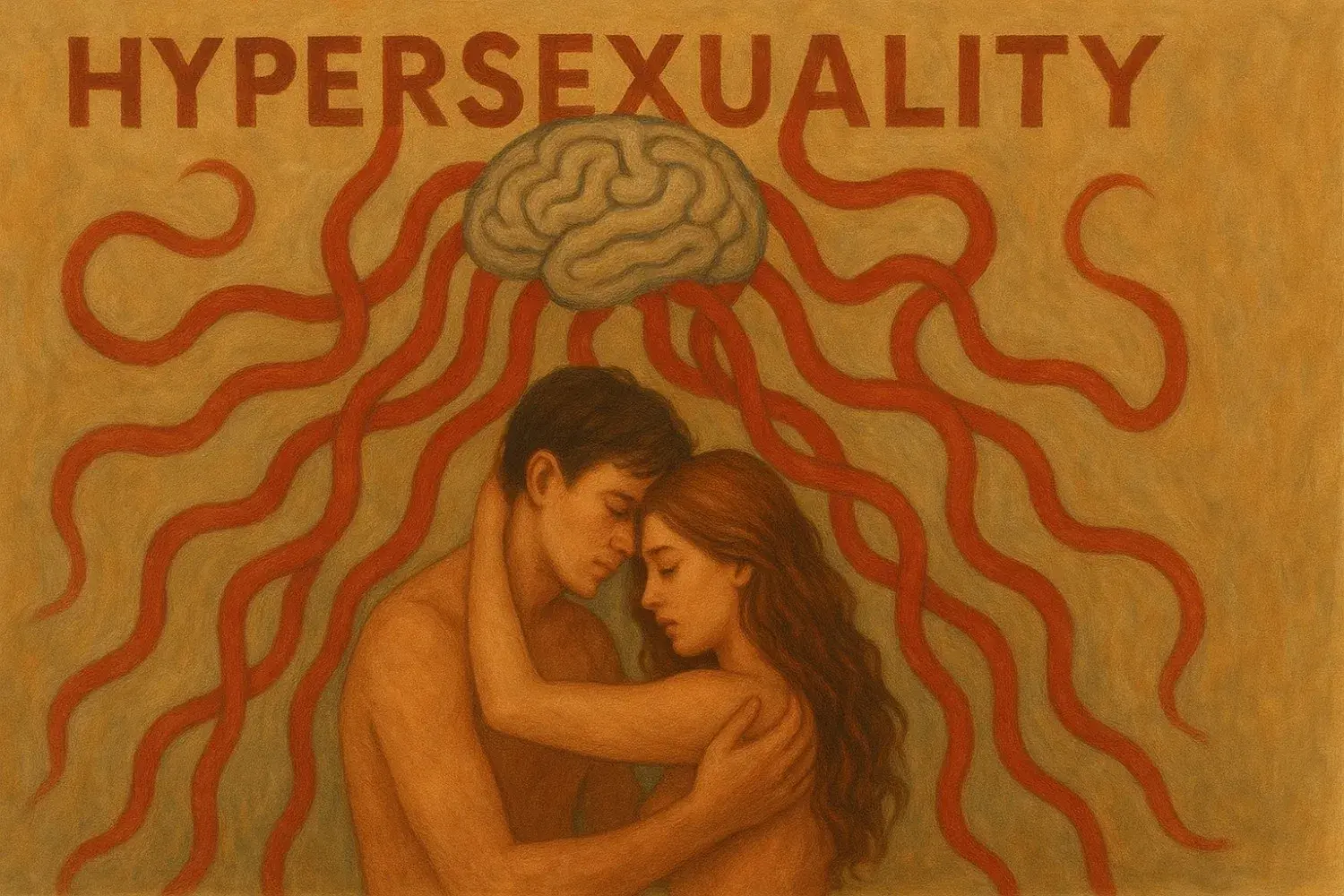
Hypersexuality (Sexual Addiction) in Bangladesh: Symptoms, Causes & Impact
If you’ve ever felt frustrated by uncontrollable sexual urges and searched terms like “hypersexual meaning,” you’re not alone. Many people in Bangladesh quietly face this issue. Hypersexuality is more than just a high sex drive—it’s a condition where sexual thoughts or actions begin to affect daily life, relationships, and mental health.
Though often misunderstood, hypersexuality is treatable. With proper medical support and therapy, most people can regain balance and confidence.
What Is Hypersexuality?
Hypersexuality means an excessive focus on sexual thoughts, fantasies, or behaviors that feel difficult to control. It may involve frequent masturbation, heavy pornography use, or repeated sexual encounters that interfere with normal life.
Having a strong libido isn’t the same as being hypersexual. The concern begins when sexual urges become compulsive and cause distress or disruption in work, studies, or relationships.
According to the World Health Organization (WHO), this condition—called Compulsive Sexual Behavior Disorder (ICD-11)—is defined as a “persistent failure to control intense, repetitive sexual impulses or urges, leading to distress or functional problems.”
What Does “Hypersexual” Mean?
The prefix hyper means “excessive” or “beyond normal.” So, hypersexual describes someone who’s sexual behaviour feels overwhelming or out of control.
You might be experiencing hypersexuality if you:
- Struggle to control sexual urges despite trying
- Feel guilt or shame afterward
- Neglect work or relationships
- Continue risky sexual behaviours despite harm
In Bangladesh, many mistake this for moral weakness rather than a medical issue. But it’s a genuine psychological condition that deserves compassion and treatment.
Hypersexuality vs. Sex Addiction
The terms hypersexuality, sex addiction, and compulsive sexual behavior disorder describe similar patterns—where sexual activity becomes uncontrollable.
Like other addictions, people may feel cravings, need stronger stimulation to feel satisfied, or become anxious when not engaging in sex.
Treatment often involves both medical and psychological approaches to manage underlying causes and prevent relapse.
Is Hypersexuality More Common in Men?
Research suggests men report hypersexual symptoms more often, though women experience it too—just less openly due to cultural barriers.
In Bangladesh, men are more likely to seek help for physical issues like erectile dysfunction, not compulsive behavior.
- Men: More likely to overuse pornography or engage in risky online sex.
- Women: Often show emotional or attachment-based patterns.
Mental health conditions such as depression, anxiety, and OCD frequently overlap with hypersexuality, especially in men.
Symptoms of Hypersexuality
Symptoms can vary, but often include:
- Constant or intrusive sexual thoughts
- Frequent masturbation or porn use
- Unprotected or impulsive sex
- Using sex to escape stress or loneliness
- Guilt or emotional fatigue afterward
- Neglecting responsibilities or relationships
- Failing to reduce behavior despite efforts
- Spending excessive time or money on sex
- Needing riskier acts for excitement
If these persist for six months or more and disrupt your life or relationship, it’s best to seek medical advice.
Complications and Long-Term Impact
Untreated hypersexuality can cause serious emotional, physical, and social problems:
- Sexually transmitted infections (STIs)
- Depression, anxiety, and low self-esteem
- Relationship conflicts or divorce
- Declining job or academic performance
- Financial strain from paid sexual services
- Substance misuse as a coping habit
- Legal trouble or risky behavior
- Sexual dysfunction such as erectile issues
Bangladesh Context
In a conservative society like Bangladesh, hypersexuality often goes unspoken. Many rely on unregulated online “solutions” or self-blame instead of seeking help. Recognizing it as a mental and behavioral condition, not a personal failure, is essential.
With confidential counseling, medical care, and the right lifestyle changes, most people can regain control, improve intimacy, and rebuild confidence.
Causes of Hypersexuality
Hypersexuality usually arises from a mix of biological, psychological, and lifestyle factors. In Bangladesh, high stress, limited mental-health awareness, and easy access to explicit content often worsen the problem.
Neurobiological Factors
Studies show that changes in certain brain regions — such as the frontal lobe, amygdala, and hypothalamus — can affect impulse control and reward response.
An imbalance between dopamine (linked to pleasure) and serotonin (linked to mood stability) may cause repetitive sexual urges, making hypersexuality resemble an addictive pattern rather than a lack of discipline.
Psychological Factors
Many people use sex or pornography to escape stress, anxiety, or low mood. Over time, that coping habit can turn into compulsion.
Low self-esteem, relationship tension, and cultural guilt about sexual topics in Bangladesh can deepen the cycle and create emotional conflict.
Medical Conditions
Some neurological illnesses such as Parkinson’s, Alzheimer’s, or head injury may lead to hypersexual behavior.
Certain drugs that alter dopamine levels can also trigger these symptoms. Though uncommon locally, doctors should remain alert to such side effects.
Hormonal Imbalances
High levels of testosterone or oxytocin can heighten desire and lower restraint.
Unregulated use of testosterone boosters or “performance enhancers,” sometimes sold in Bangladesh without prescription, can intensify the problem.
Medication and Drug Use
Dopamine-based therapies and stimulant drugs like cocaine or methamphetamine may raise sexual drive and reduce control.
While rare, substance-linked hypersexuality is emerging among younger users and needs more public awareness.
Risk Factors for Hypersexuality
Certain traits and conditions can make someone more prone to hypersexual behavior. Understanding these risks helps with early support and prevention.
Mental Health Conditions
People living with bipolar disorder, anxiety, or PTSD are more likely to experience compulsive sexual urges.
Research suggests that up to nine in ten people with hypersexuality also struggle with mood or substance-use disorders.
In Bangladesh, untreated depression and the taboo around therapy can make this connection stronger.
Attention-Deficit/Hyperactivity Disorder (ADHD)
Those with ADHD often act impulsively, which can lead to frequent pornography use or risky sexual behavior.
Studies show roughly one in four people with ADHD experience some level of hypersexuality, particularly in high-stress or digitally overstimulated environments.
Family History of Addiction
Having parents or close relatives with addictions — to drugs, gambling, or even sex — increases vulnerability.
In Bangladesh, where family discussions about emotional health are limited, these inherited patterns often go unnoticed until adulthood.
⚠️ Note for Bangladesh
Many people here mistake hypersexuality for a moral weakness rather than a health condition. In truth, it’s a treatable behavioral disorder.
Early counseling, medical evaluation, and balanced routines can help restore control, rebuild intimacy, and protect mental well-being.
Diagnosis of Hypersexuality
Diagnosing hypersexuality can be complex. It isn’t formally listed in the DSM-5, yet trained clinicians can identify it through careful discussion and behavioral assessment.
Your doctor may ask about:
- Sexual habits and frequency
- How these behaviors affect work, mood, or relationships
- Attempts to control them
- Any drug use or mental-health issues
Symptoms usually cause distress or loss of control lasting at least six months, with repeated failed efforts to stop.
Tests may also be done to rule out hormonal changes, neurological issues, or underlying mental disorders.
Diagnosis in Bangladesh
In Bangladesh, many hesitate to speak about sexual problems. Doctors, however, treat such matters confidentially. Open, honest answers help them find whether the root is emotional, hormonal, or medical — and guide the right treatment.
Treatment of Hypersexuality
Hypersexuality is treatable. Most people improve with a mix of therapy, medication, and support. Progress takes time, but real recovery is possible.
Therapy
Cognitive Behavioral Therapy (CBT) helps recognize triggers and replace harmful thoughts with healthier habits.
Sessions may be individual, with a partner, or in small groups. Therapy also reduces guilt and builds coping skills for long-term control.
Medication
If hormones or brain chemistry are involved, doctors may treat those first.
Common options include:
- SSRIs (antidepressants): help lower sexual urges
- Naltrexone: reduces reward-driven impulses
- Anti-androgens or GnRH analogs: control testosterone in severe cases
All medicines must be prescribed by a qualified doctor. Avoid self-medication or unverified online drugs.
Support Groups
Support communities such as SLAA or SAA follow a 12-step recovery model. They help reduce isolation and provide accountability.
Online versions of these groups are accessible for Bangladeshi users seeking confidential peer support.
Prevention of Hypersexual Behaviour
There’s no single way to prevent hypersexuality, but early awareness helps manage it better.
- Act early: Seek help when urges start to feel uncontrollable.
- Know your triggers: Limit exposure to stress, alcohol, or online content that fuels compulsion.
- Look after mental health: Address anxiety, depression, or loneliness early.
- Stay connected: Share struggles with trusted friends or therapists.
- Adopt healthy outlets: Exercise, mindfulness, and creative work reduce stress and improve focus.
Balanced routines and open communication keep impulses in check.
Key Takeaways
Hypersexuality — also called sex addiction or compulsive sexual behaviour — is a real and manageable condition.
Though not in the DSM-5, doctors use proven methods to diagnose and treat it.
Remember:
- It may appear as constant pornography use, frequent masturbation, or risky sexual behavior.
- Causes include hormonal imbalance, mood disorders, ADHD, or certain drugs.
- Recovery involves therapy, medication, and steady emotional support.
Bangladesh Context
In Bangladesh, stigma often delays treatment. Recognizing hypersexuality as a medical and psychological issue, not a moral fault, is the first step forward.
With private counselling and proper care, most people regain control, rebuild trust, and live balanced, confident lives.




